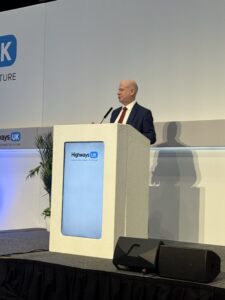Improved services, simpler fares and integrated ticketing are all part of plans to move public transport ‘significantly closer’ to the standards of London, according to the Government’s Levelling Up White Paper.
The Levelling Up White Paper reiterates the Ten-Point Plan funding commitment launched in 2020 with schemes already underway, including the West Midlands’ ‘Sprint’ project, which is delivering a bus rapid transit system, and Coventry’s very light rail scheme.
The UK is also expected to see new improvements in bus speeds, services and ticketing as part of priority schemes in West Yorkshire and the West Midlands, as well as reduced ticket prices in places including Stoke-on-Trent, Portsmouth, Luton, Derbyshire, Warrington.
Responding to the White Paper, Mark Kemp, 1st Vice President of the Association of Directors of Environment, Economy, Planning & Transport’s (ADEPT) said: “ADEPT has been calling on government to act across many of these areas to develop quality places, so we are pleased to see many of our asks have been recognised, including for our high streets and town centres. We also welcome the emphasis on local skills and the recognition of health inequalities and look forward to further details.
“ADEPT is pleased to see greater recognition given to the essential role of local government in achieving national aims. It is something we have long asked for. We are also pleased to see it recognised that as local place leaders, we are best able to respond to local need and we welcome the opportunity to access the resources, funding and powers needed to achieve real change for our communities. Simplified funding streams, with less of the competitive bidding that has long been a bugbear for local councils, will help us achieve our goals.
“The emphasis on funding for housing outside of the south east shouldn’t come at the expense of much needed social housing throughout the country and we hope that this will be addressed by government. Minimum standards for private rented accommodation are essential but we would have preferred to see a concrete commitment to investment in social housing and not just home ownership.
“The 12 missions recognise how true levelling up will require a cross-sector cross-government approach, cutting across departmental silos which, alongside strong local leadership, is something ADEPT has frequently raised with government. We are disappointed that the missions don’t appear to include protecting and improving the natural environment, and levelling up access to it for disadvantaged groups. With much detail, funding and resource yet to be announced, we welcome the government’s ambition but wait to see the detail”.
The Levelling Up White Paper acknowledges that transport infrastructure is an important form of physical capital because it reduces ‘distances’ between places and provides people, frms and workers with increased market access. This, it says, brings with it increased economic benefts meaning less well-connected places can get left behind.176
According to research for the White Paper, currently, transport infrastructure is most expansive in London and the South East. This unlocks access to more jobs in these areas than elsewhere. For example, public
transport unlocks double the number of jobs in Aldershot than in Halifax. Intra-city transport is also better in London. In Newcastle and Glasgow, spending an hour on public transport only increases job access by one third,
but almost quadruples job access in London.
When it comes to commute time, however, the story is different. Londoners spend by far the longest time travelling to and from work.180 And while the existing transport infrastructure is most extensive in London and the South East, it is also under the most strain, reflecting the sheer size of London’s labour market.
Transport infrastructure investment has tended to flow to places where infrastructure is under the greatest strain rather than least extensive. The OECD funds that historic investment is considerably higher in London and the South
of England than in other parts of the UK. Nearly 30% of all public transport infrastructure spending is in London, and spending per capita is double that in Scotland and three times that in Northern Ireland
These dynamics suggest an important circularity, with a growing labour market increasing the strain on transport systems, attracting greater infrastructure investment and prompting further growth in the jobs market, thereby further
increasing pressures on transport systems.
The White Paper said the Government’s policy programme is focused on:
a. local transport;
b. empowering local leaders; and
c. connectivity between economic centres.
“Local transport, particularly buses, is crucial to connect people to jobs, education and wider opportunity. For example 77% of jobseekers outside of London do not have regular access to a car, van or motorbike for personal use
for work or interviews,” said the White Paper.
Since 2020, the UK Government has published the National Bus Strategy and Cycling and Walking Plan, backed by over £5bn of funding for buses and active travel over this Parliament. £3bn has been allocated for transforming buses.
In places where it will make the most impact, the UK Government will enable increased frequencies and reduced fares, with high-frequency services in densely-populated areas and new forms of demand-responsive transport to places, such as business parks and rural villages, that are not well served by linear bus routes.
A pilot project starting this spring will be in Cornwall, an area where despite significant improvements in the quality of bus services in recent years, the cost of public transport remains a significant barrier to use and opportunity. The UK
Government and Cornwall Council will launch a new Superbus network, which will help to reduce fares by around 30% during the first phase, under the new Transport for Cornwall brand, which brings together all bus operators and the
main train operator GWR.
In cities, new bus priority lanes will make buses faster, more reliable, more attractive to passengers and cheaper to run – enabling operators to invest further in making services better and reduce fares. Schemes include new green
bus corridors in Liverpool and quality bus transit schemes in Greater Manchester.
In the West Midlands, Mayor Andy Street is building a new bus rapid transit system, “Sprint” – a cross between a bus and a tram, with long sections of segregated and dedicated route – to connect Birmingham Airport, Solihull and
Walsall with Birmingham city centre. Coventry is developing a brand new very light rail system for the city, starting with a demonstrator route from Coventry Rail Station to Pool Meadow Bus Station. Coventry has also received £50m to
become the frst all-electric bus city, with almost 300 new zero emission buses to be delivered over the coming years.
The White Paper Signifcant bus transformation will be funded in these and the other Mayoral Combined Authority (MCA) areas, including major rapid bus priority schemes and fares improvements in West Yorkshire and the West of England.
Outside the MCA areas, the UK Government will fund ambitious plans for bus improvement, enhancing services and reducing fares, in Stoke-on-Trent, Portsmouth, Luton, Derbyshire, Warrington and many other places. This is
not an exhaustive list of authorities which will be given funding. Further discussions will be held with these and other councils to ensure their commitment to the improvements set out in the National Bus Strategy.
Over £500m is being spent this Parliament on delivering zero-emission buses, plus over £440m on bus priority and other capital schemes outside the MCA areas. For the MCA areas, the Government’s £5.7bn City Region Sustainable
Transport Settlements include investments of around £1bn to improve buses. In addition to these sums, more than £2.3bn in total will be paid across the Parliament to improve and maintain services. A further £360m will be spent to introduce London-style contactless ticketing across regional rail commuter networks, delivering price capping.
As well as improvements to bus routes, the UK Government is spending over £200m this year and a total of £2bn across the Parliament on improvements for cycling and walking. Much of the new infrastructure will be in places where
funding is most needed, from Blyth to Falmouth. The new Executive Agency, Active Travel England, will work with local authorities on the detailed design of schemes over the months ahead.
Finally, said the White Paper, well maintained local road networks are a key form of local transport. The UK Government is already investing more than £5bn from 2020 to 2025 for highways maintenance to local highways authorities across England, enough to fill millions of potholes a year, repair dozens of bridges and resurface hundreds
of roads up and down the country. This is in addition to the £2.6bn to deliver over 50 road upgrades, such as bypass and junction upgrades in Stoke, Devon and Lancashire.
At SR21, the UK Government announced City Region Sustainable Transport Settlements, with an investment package of £5.7bn for eight English city regions to transform local transport networks through London-style integrated
settlements. This is a 94% increase on equivalent funding delivered between 2017-18 and 2021-22.
In addition, Local Transport Authorities (LTAs) will take on greater powers and responsibilities, so that they can plan their transport systems more effectively. The UK Government will also explore devolving more transport powers and
responsibilities in England.
The UK Government will support all LTAs by publishing new guidance on Local Transport Plans, so that all LTAs can deliver updated plans by the end of this Parliament, with clear project pipelines and comprehensive strategies to
improve local transport for people and reduce carbon emissions. The UK Government will also explore regional centres of excellence that can provide bespoke support to LTAs. Future funding will be dependent on the delivery of
these plans and wider LTA performance.
The UK Government will also explore devolving more transport powers and responsibilities
in England
Andy Bagnall, Director General of the Rail Delivery Group, said: “The railway is crucial to successfully ‘levelling up’ the country. It has the power to boost local economies, connect people to jobs and transport goods to businesses. To get reform right and deliver what passengers want, it’s essential that the new passenger service contracts enable Great British Railways to guide, rather than control, the industry and to listen to and empower operators and the regions.”
























